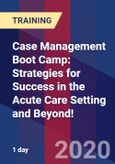Please join us for this intense one-day program that will give you the skills to succeed as a case manager or social worker in the new era of value-based reimbursement and accountable care. The world of healthcare is changing so rapidly and so is the role of case management in that world! Whether you are reading or hearing about value-based reimbursement, the Affordable Care Act, the continuum of care, bundled payments, transitions in care, or accountable care organizations, case management is at the center of it all!
Because things are changing so rapidly, it can be a challenge to stay current and knowledgeable in the issues that most greatly impact your role as an acute care case manager or social worker. Reimbursement has changed dramatically as has utilization management, transitional planning and compliance. The Centers for Medicare and Medicaid Services (CMS) has incorporated changes that impact on payments related to readmissions, length of stay and cost of care. Who is in a better place to address these issues than case managers and social workers! Finally, how do you measure your impact on the cost and quality of care and the reimbursement your organization receives for that care?
All these topics and more will be covered in this jam-packed one-day program. The day will start with an overview of the state of the art in case management today, how we got here, and where we are going in the future. From there we will discuss the often-confusing subject of all the roles that occur in best practice departments.
You will learn more about the complimentary, but separate roles of RN case managers and social work case managers. From there, we will address best practice case management department models. We will then review what utilization management and transitional planning really mean under the current CMS rules and the new CMS proposed rules. We will end our series with a discussion on the best ways to measure the outcomes of your case management department and its impact on the organization.
Whether you are new to case management or a seasoned pro, this program will provide you with the latest and most up-to-date topics and information that you will need to be at the top of your game and produce the best outcomes for you, your patients and your organization.
Learning Objectives:
- Understand the history of case management, the current state, and directions for the future.
- Describe contemporary case management roles and models.
- Review the role of utilization management in an era of value-based purchasing.
- Discuss how transitional planning can be done most effectively in the new healthcare environment.
- Ensure that you and your case management department are maintaining compliance.
- Understand the outcome measures you will need to measure the success of you and your case management department.
Agenda
DAY 01(10:00 AM - 5:00 PM EST)10:00 am - 11:00 am : Module 1 - “The State of the Art in Case Management: 2018 and Beyond”
We can’t fully understand case management without a brief look at the history of health care access in the 20th century, The development of the health care insurance, healthcare as a benefit and the introduction of Medicare and Medicaid. Case management developed from utilization review and quality assurance changing it’s name and focus 1985 following the introduction of prospective payment. Today case management is found across the continuum of care, most recently returning to the community where its roots began. This module will review where case management came from and how it will work in today’s managed care and government payer environments. We will see how the Affordable Care Act broadened the practice making it essential to the viability of the industry.Included will be a review of Medicare’s latest programs that impact on the role of the case manager most directly including value-based purchasing, the readmission reduction program, accountable care organizations and others. Take a glimpse into the future in this state-of-the art review.
11:00 am - 11:45 am : Module 2 - “Roles, Functions and Models for RN Case Managers and Social Workers”
The role of the case manager and social worker is dynamic and constantly changing in response to the changes in health care delivery and reimbursement at the federal, state and local levels. While change remains a constant, there are certain core roles and functions that apply to the work of the social worker and nurse case manager regardless of job setting. In addition, case managers and social workers work within guidelines that provide us with definitions of practice, guiding principles and philosophy statements. This module will include these issues plus a description of the best practice case management models and how the roles of RNs and social workers can be developed to meet the outcomes of a hospital in the era of value-based purchasing. We will also touch on staffing models and caseload calculation.
11:45 am - 12:15 pm : Module 3 - “Utilization Management” What Does it Really Mean?”
Utilization management was the first role applied in acute care case management models. It was first known of as utilization review but has evolved into something much more comprehensive than that. Today it encompasses elements of resource management and denials management as well. This module will review the role of utilization management as it applies to today’s contemporary case management models. Included will be best-practice suggestions for your practice and for denials management with tips and strategies for stream-lining the process and promoting efficiency.
12:15 pm - 01:15 pm : Lunch
01:15 pm - 02:30 pm : Module 4 - “Transitional Planning Under the Current and Proposed CMS Rules”
Discharge planning is a limiting term applying only to movement from the hospital to the next level of care. Transition planning is the 21st century version encompassing the full continuum of care, It is a “process” that starts at the point of encounter in or outpatient and follows the patient through their healthcare journey. The Centers for Medicare and Medicaid Services have recently added more “teeth” to the process. This module will review the most recent changes from the Medicare program as well as strategies for safely transitioning your patients across the continuum of care. In addition, we will review how to engage other members of the interdisciplinary care team in the process of planning for the patient’s movement across the continuum including verbal and written hand-off communication. Transition planning is no longer a destination but a process! Learn how to be sure that your processes address the complexities of the new healthcare environment.
02:30 pm - 02:45 pm : Break
02:45 pm - 04:00 pm : Module 5 - “Applying Compliance Measures to Your Role as a Case Manager”
As case managers we must be aware of the myriad of compliance issues that we must adhere to in our daily practice. Never has this been more important to our work as case managers than it is now. This program will review the compliance issues that most greatly impact on your practice such as the 2-midnight rule, the NOTICE Act, HINNs, the Conditions of Participation, and many others. The Joint Commission and other hospital accrediting bodies are now monitoring these issues when they have deemed status from Medicare, so your compliance is critical to a good hospital survey outcome. This module will help you to identify where you may have compliance practice gaps as well as how to fix them!
04:00 pm - 04:45 pm : Module 6 - “Measuring the Success of Your Case Management Model”
When all is said and done, how do we know that we are doing a good job as case managers. How do we know what our impact is on our patients and on the organization? We will discuss the use of metrics vs anecdotal information. This module will discuss the latest ways in which case management departments and staff can ensure that they are achieving the outcomes that they hope to achieve. Included will be what the latest outcomes measures are in the field of case management as well as examples of dashboards that you can create to track and trend your results over time.
04:45 pm - 05:00 pm : Wrap-Up/Q & A
Course Provider

Laura Ostrowsky,
CMSALaura Ostrowsky RN, CCM MUP is the current president of the NYC chapter of CMSA. She is teaching a CCM prep course with the Case Management Institute, working with Athena Forum and writing and consulting on case management and related topics. Laura has published articles on Case Management in CMSA Today, Professional Case Management, Case in Point, The Patient Flow Journal and other periodicals. She regularly presents at national conferences including CMSA, the Patient Advocate Institute, NTOCC and others on topics ranging from case management, patient flow and payer provider collaboration to advocacy, collaborative practice and case management’s role in the changing health care environment.
Laura is a past Director of Case Management at Memorial Sloan-Kettering Cancer Center (1999-2019) and the 2012 CMSA Case Manager of the Year. Her program was been nominated by Case in Point for excellence in Utilization Management, Discharge Planning and Transitions in Care and awarded the patient Advocate Award. She created a patient advocacy program to assist patients in obtaining access to specialty care despite network restrictions. The program has been featured in articles in Advance for Nursing, The Wall Street Journal, Case in Point, and Case Management Monthly.
Who Should Attend
- Coordinator Utilization Management/Case Management
- Account Management/Executive
- Administrative Director Care Management
- Population Health
- Analyst Clinical Documentation & Care Coordination
- Appeals Manager
- Patient Care Services and Logistics
- Clinical Documentation
- Continuum Care Management
- Integrated Care Delivery
- Medical Director Hospitalists
- Medical and Academic Affairs
- Medical Officer Clinical & Quality Services
- Family Medicine
- Hospitalist Consultants
- Specialist Health Information Management
- Denial Management Specialist
- Resource Management
- Utilization Management
- Transfer Center
- Clinical Operations-Nurse Consultant
- Health Management
- Health Social Work
- Integrated Care Management
- Manager Revenue Cycle









